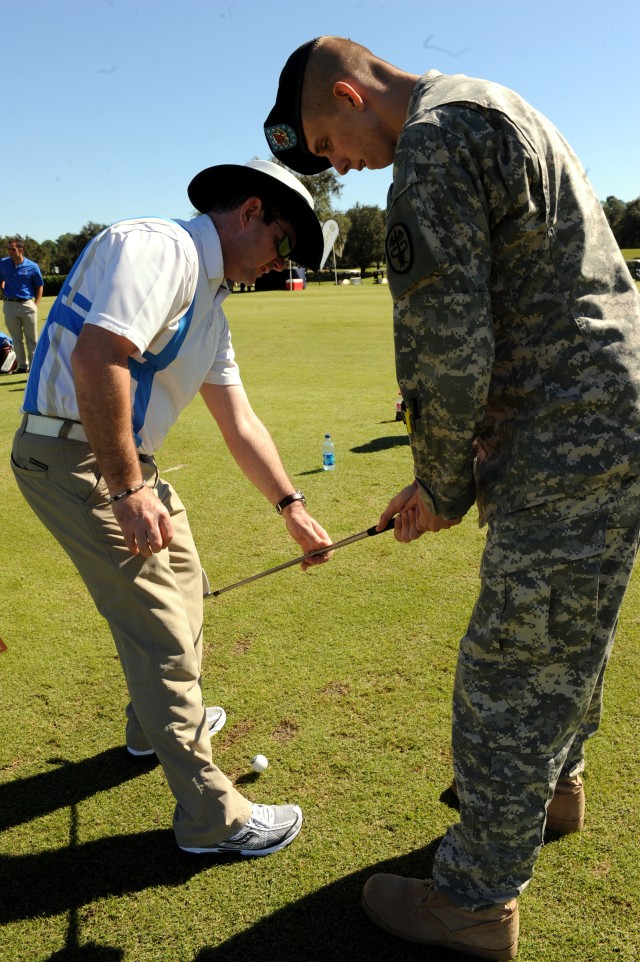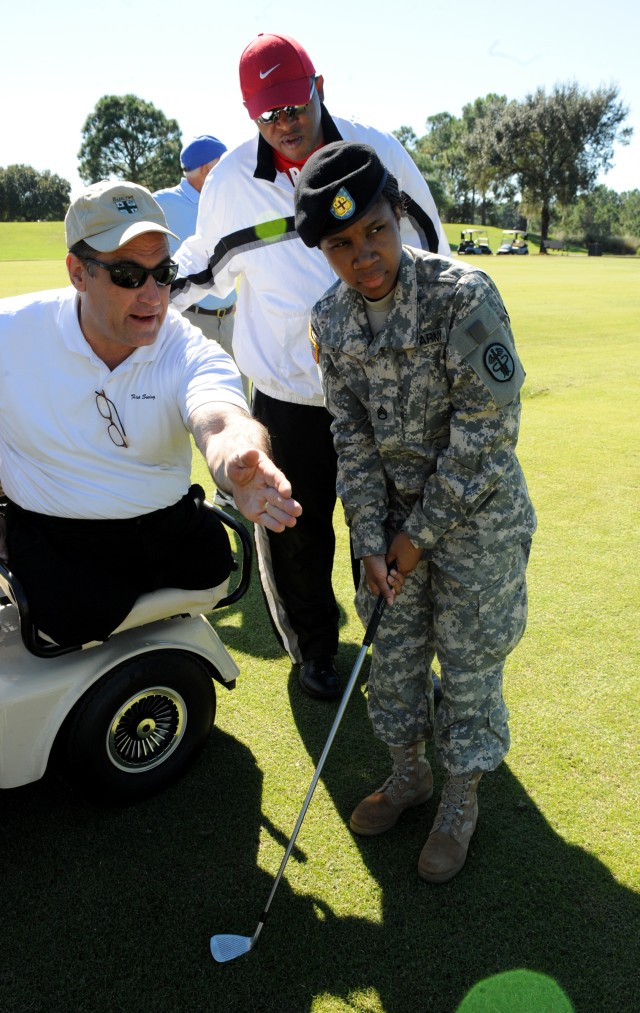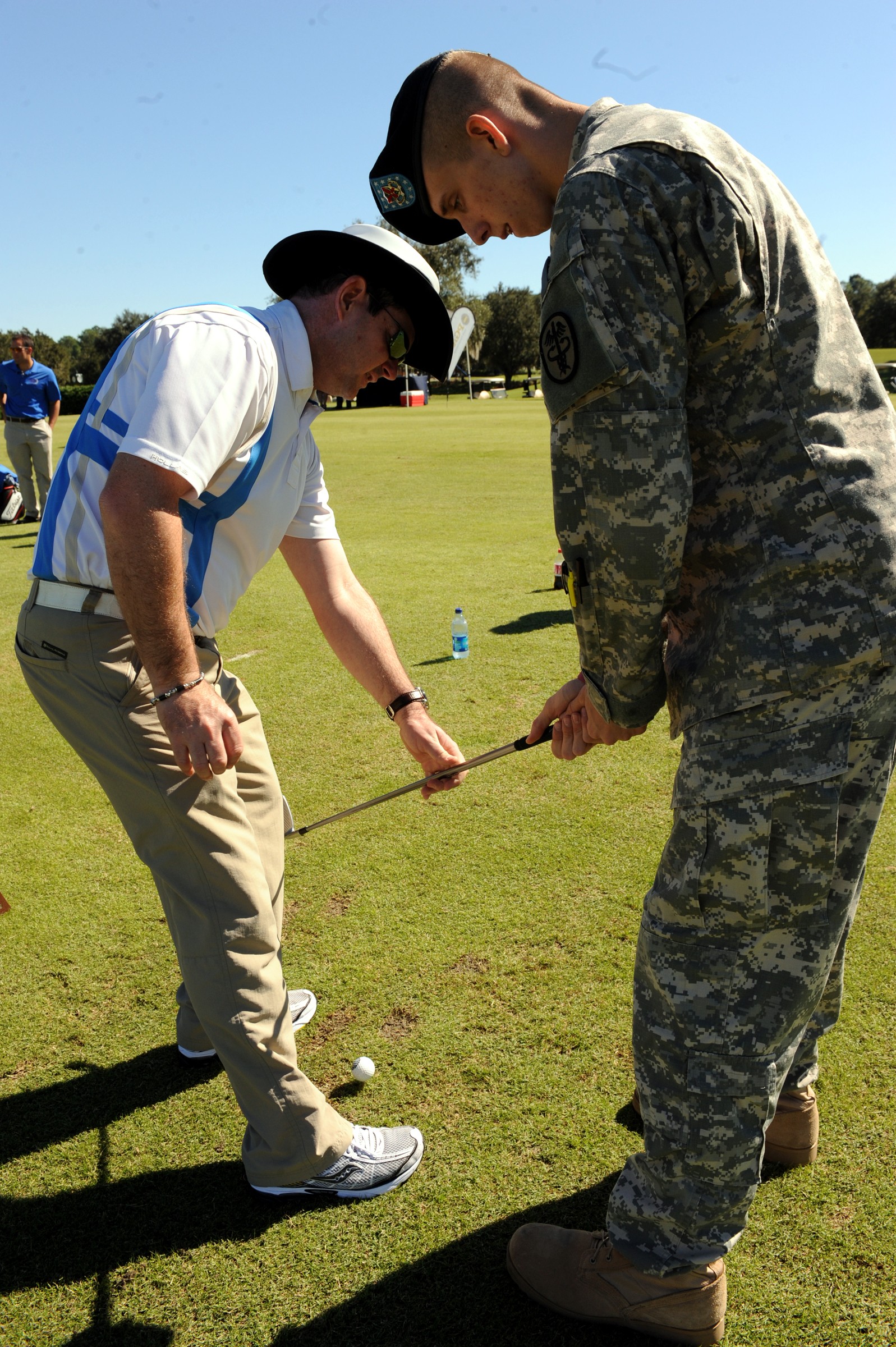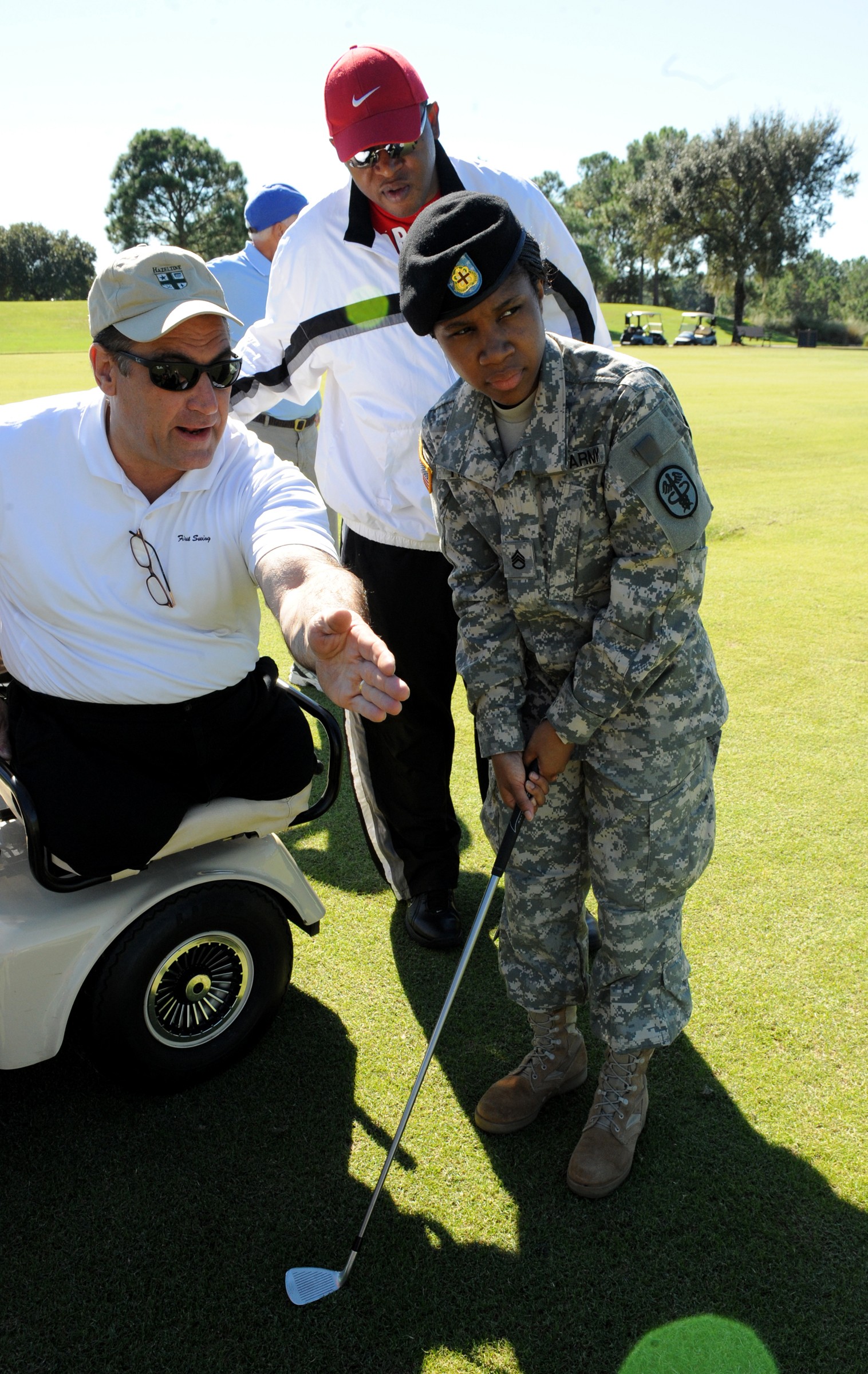LAKE BUENA VISTA, Fla. - PGA Tour golfers Rory Sabbatini and Kris Blanks took time out of their busy schedules Nov. 9 to provide golf tips to Warrior Transition Unit Soldiers and military Veterans at Walt Disney World's Osprey Ridge Course.
The event was conducted in conjunction with the Children's Miracle Network Classic at Walt Disney World Resort, the final tournament of the PGA Tour season, scheduled for Nov. 11-14 on Disney's Palm and Magnolia Courses.
First Swing instructors Rick Monroe and Marty Ebel of the National Amputee Golf Association came from Texas to help support the Army Family and Morale, Welfare and Recreation Command event designed to help wounded and able-bodied Soldiers realize that golf can be a great equalizer and healer - both physically and psychologically.
They were joined by Adaptive Golf Academy's David Windsor, the 2008 North Florida PGA Teacher of the Year; James Bond of the James A. Haley Veterans Hospital in Tampa, and Anthony Netto, president of the Stand Up and Play Foundation.
"We can't wait to enlighten you a little bit further today on how the great game of golf is benefitting lives," said Windsor, who served as emcee for the clinic.
"I know men and women are sacrificing daily to afford us the opportunities that we have here," Sabbatini said. "I see this as an opportunity to give back a little bit of the time and effort they've given us. 'Thank you' to them. We're here just to show our appreciation."
Blanks, a former junior club golf champion at Fort Belvoir, Va., then chimed in.
"My dad is retired Air Force," Blanks said. "So it's great for me to do things like this and meet the servicemen and women who are providing me the freedom to do what I do. My hat's off to you guys for doing what you do."
Army FMWRC golf director Michael McCoy of Fort Sam Houston, Texas, welcomed everyone.
"It took a lot of effort from a number of people to pull this thing off," McCoy said. "Obviously, we thank all the WTUs and retirees who were able to get together and participate in this clinic. We're looking to do more of these types of things in the future."
The primary mission of the clinic was to help folks realize that golf is a rehabilitation tool and a lifetime activity for disabled and able-bodied people. Getting to rub elbows with PGA Tour pros, a rarity at such clinics, was a bonus.
Capt. Jose Otero spent nearly a year rehabilitating a bilateral shoulder injury with the Warrior Transition Unit in Orlando after returning from deployment in Afghanistan. On Tuesday, he swung a golf club for the first time.
"I was like 'Wow!' Otero said. "As soon as I did what the instructor said, I started whacking that bad boy. I'm definitely onto something now. This is something I want to pursue."
Otero, 37, a native of Puerto Rico who grew up in Orlando, also plans to give back to the WTU program.
"The community-based Warrior Transition Unit is an outstanding program," he said. "It helps you heal more rapidly, not only mentally but physically, because you're with your Family. I've been on the go for the past four years - just going on deployments; mission-hopping, like we call it - and now that I'm back, this is great.
"This is one of the many events that are available to give Soldiers options if they are looking at getting out of the Army or just hanging up their hat and they don't have a civilian plan. In my case, it's given me a sense that the American people support us, that the community - at least in my state in Florida - they support us 100 percent.
"It's like a sense of brotherhood that inspires me to stay on and just get through this hump, get better, and get back to missions. ... I'm ready to go back. I'm not ready to call it a day; I'm in my prime right now."
The camaraderie at the clinic most impressed Otero, a 10-year Army veteran.
"I'm surrounded by people who are retired. I'm surrounded by combat veterans. I'm surrounded by people who appreciate what we do," Otero said. "It's an environment that fosters Soldiering and brotherhood. That's what I really like about it."
Spc. Brandon Cornwell, 20, of the 53rd Infantry in Cocoa Beach, Fla., did not want to discuss the injury that sent him from Iraq to seven months of rehab at Walter Reed Army Medical Center in Washington. He did, however, enjoy talking about his newest physical endeavor.
"It's awesome," Cornwell said. "This is the first time I've ever had a golf club in my hands and I picked it up pretty easily. It's fun. I just need some more practice."
Bond, 53, of St. Augustine, Fla., is a former Army tank mechanic and an above -the-knee amputee whose motorcycle crossed paths with a drunken driver. He took up golf three years ago and vowed to never put it down.
He got involved when Windsor brought his adaptive golf program to an amputee support group at the veterans hospital in Tampa.
"He said 'which one of you old, one-legged guys wants to learn how to play golf'' and we all raised our hands," recalled Bond, whose prior golf experience consisted of "hitting a driving range with a six-pack with my buddies when I was 18."
"He asked me what I do, and I said 'Well, I play pool, and I kayak.' He said: 'Great. You put those two together and you can swing a golf club.'
"I was cracking that thing and the balls were just taking off. That was three years ago, and I've been playing golf ever since."
Bond has competed in several tournaments, including two trips to the National Veterans TEE Tournament in Iowa City, Iowa.
"Playing golf is magnificent - just being around all the people and all the other Vets," Bond said. "You have to be there with three one-legged guys playing golf to understand. You've got to be with a disabled Vet to see how much it means to us to be able to get out and do this.
"It doesn't matter what condition you're in, there's an adaptive program and adaptive equipment to play golf. And you can adapt yourself to play the game."
First Sgt. (ret.) Larry Babitts, 79, served in the Army from 1954 until 1975. On this day, he took his first swing at a golf ball.
"I've never been on a golf course in my life, but I got a quick feel for it - makes me wonder why I haven't been doing this," he said. "I have trouble standing, but it's worth a try."
Babitts was honored to mingle with fellow Veterans and Soldiers, and amazed that PGA Tour golfers were involved.
"I just enjoying being out," he said. "I can't believe these pros have time for this. I mean they all work. They're busy guys."
Brent Rush, a part-time caddie for Blanks, said working the clinic might be the highlight of his week away from Palm Beach Gardens with Family.
"I'm glad I came out here today," Rush said. "It was a treat for me to do this. I didn't think I was going to actually help out, but it was very gratifying.
"To help one of these wounded Soldiers be able to hit a shot and see his gratitude is just awesome. This was worth my whole trip up here."




Social Sharing